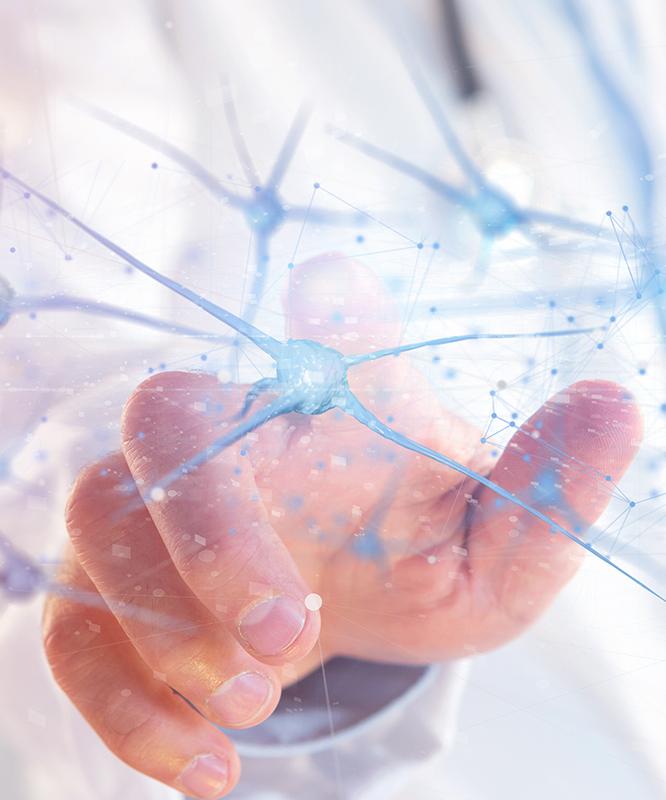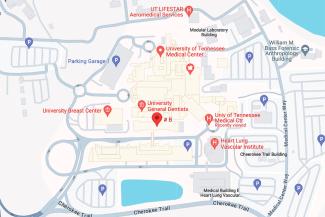Part of the Brain & Spine Institute
University NeuroInterventional Radiology
• Main Campus
Address
1928 Alcoa Hwy
Building B, Suite 315
Knoxville, TN 37920
Phone
865-305-4908
Fax
865-305-7939

Part of the Brain & Spine Institute
• Main Campus
Address
1928 Alcoa Hwy
Building B, Suite 315
Knoxville, TN 37920
Phone
865-305-4908
Fax
865-305-7939

Neurointerventional radiologists see some of the most complex blood vessel conditions in the brain and spine. These physicians use minimally invasive procedures to treat intricate cases in the shortest amount of time—cases that until recently were considered untreatable. Advances in medicine and technology created the opportunity for this growing medical specialty: neurointerventional radiology.
The medical center’s neurointerventional radiology service, a subspecialty of radiology, was developed in 2003 and collaborates with the Brain and Spine Institute. Neurointerventional radiologists work closely with board-certified neurologists, neuroanesthesiologists, neurosurgeons, vascular surgeons and a Comprehensive Stroke Center team to offer innovative, minimally invasive treatments for life-threatening conditions related to the brain and spinal cord, such as aneurysm coiling.
The University of Tennessee Medical Center’s Comprehensive Stroke Center offers the latest technology in the neurointerventional biplane suite, which is a state-of-the-art treatment environment, converting instantly from a neurointerventional radiology suite to a microsurgical suite for vascular brain surgery. To expedite treatment, the biplane suite is adjacent to the emergency department for easy access. Patient safety, always a top priority, is greatly enhanced by faster assessment and transition to treatment. The suite’s biplane system provides the most advanced digital imaging capabilities. It is designed to offer ideal projection angles, patient access, and integrated software that speeds diagnosis with real-time evaluations and study comparisons. The system produces three-dimensional images of a patient’s head along two planes.
After diagnosis and treatment, patients may be admitted to the Neurocritical Care Unit located at The University of Tennessee Medical Center. This highly specialized unit is staffed with an elite team of specially trained critical care nurses, respiratory therapists, nurse practitioners, physician assistants and nursing assistants, all dedicated to helping patients toward recovery. The critical care team also includes social workers, physical therapists, speech-language pathologists, occupational therapists, nutritionists and clinical pharmacologists. Completing the team are patients and their families, who participate in discussions and decisions concerning goals, treatment options and plans of care.
At the only academic medical center in the region, patients receive 24-hour-a-day care from a Comprehensive Stroke Center team and are served by a dedicated group of specialty-trained neurologists, neurosurgeons and neurointensivists (specialists in neurocritical care). All these professionals work collaboratively with neurointerventional radiologists to provide many treatment options.
Merging sophisticated technology with a unique collaboration of health care professionals among various neurospecialties allows us to give our patients the best chance of survival and fast recovery.
All members of the medical center’s multidisciplinary teams are committed to patient safety and comfort—a crucial mission in high-quality care. This commitment is evidenced at a weekly neuro-vascular case conference that is held to review difficult cases and discuss options to ensure best patient outcomes.
Neurological disorders can be challenging and difficult. But genuine collaboration, like that at The University of Tennessee Medical Center, strengthens treatment and improves patients’ chances of a full recovery.
Referring offices can request an appointment by completing the form and faxing it and patient records to our office. Our fax number is 865-305-7939.
Address
1928 Alcoa Hwy
Knoxville,
TN
37920
Where we are
Building B, Suite 315
parking
Garage H

At the only academic medical center in the region, patients receive 24-hour-a-day care from a Comprehensive Stroke Center team and are served by a dedicated group of specialty-trained neurologists, neurosurgeons and neurointensivists (specialists in neurocritical care). All these professionals work collaboratively with neurointerventional radiologists to provide many treatment options.